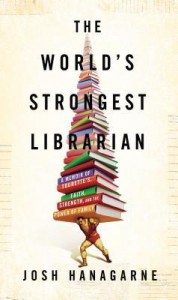 Format read: ebook provided by NetGalley
Format read: ebook provided by NetGalleyFormats available: ebook, hardcover, audiobook
Genre: Memoir
Length: 288 pages
Publisher: Gotham Books
Date Released: May 2, 2013
Purchasing Info: Author’s Website, Publisher’s Website, Goodreads, Amazon, Barnes & Noble, Kobo, Book Depository
Josh Hanagarne couldn’t be invisible if he tried. Although he wouldn’t officially be diagnosed with Tourette Syndrome until his freshman year of high school, Josh was six years old and onstage in a school Thanksgiving play when he first began exhibiting symptoms. By the time he was twenty, the young Mormon had reached his towering adult height of 6’7” when—while serving on a mission for the Church of Latter Day Saints—his Tourette’s tics escalated to nightmarish levels.
Determined to conquer his affliction, Josh underwent everything from quack remedies to lethargy-inducing drug regimes to Botox injections that paralyzed his vocal cords and left him voiceless for three years. Undeterred, Josh persevered to marry and earn a degree in Library Science. At last, an eccentric, autistic strongman—and former Air Force Tech Sergeant and guard at an Iraqi prison—taught Josh how to “throttle” his tics into submission through strength-training.
Today, Josh is a librarian in the main branch of Salt Lake City’s public library and founder of a popular blog about books and weight lifting—and the proud father of four-year-old Max, who has already started to show his own symptoms of Tourette’s.
The World’s Strongest Librarian illuminates the mysteries of this little-understood disorder, as well as the very different worlds of strongman training and modern libraries. With humor and candor, this unlikely hero traces his journey to overcome his disability— and navigate his wavering Mormon faith—to find love and create a life worth living.
My Review:
 The first chapter of The World’s Strongest Librarian should be required reading for people who want to become librarians. Especially the ones who have a completely romanticized view of what it is like to actually BE a public librarian on a day-to-day basis. At the end of the chapter, I think they’ll still want to do the job, but they’ll have one hell of a lot better idea of what they’re letting themselves in for.
The first chapter of The World’s Strongest Librarian should be required reading for people who want to become librarians. Especially the ones who have a completely romanticized view of what it is like to actually BE a public librarian on a day-to-day basis. At the end of the chapter, I think they’ll still want to do the job, but they’ll have one hell of a lot better idea of what they’re letting themselves in for.
And I laughed myself silly. On the bus. It’s too bad I wasn’t in the staff room at work. At least, then, I could have shared instead of just sounding like a lunatic.
But all professions have their in-jokes, and that’s not what’s at the heart of this book, or Josh’s story.
Josh does share his profound love of reading in a way that is joyful. He obviously deeply loves reading, but uses it to escape from a world that has often contained it’s share of difficulties. While his memoir covers his struggle with Tourette Syndrome, I think that a lot of us who have become librarians have, in one way or another, found an escape from something in the pages of books that we have loved.
Josh just has a more compelling way of expressing both his love of the books that he is diving into, and the sometimes seemingly overwhelming challenges that he faces, than most of us do.
 This is a hard book to review. It feels as if I’m reviewing Josh’s life as well as the way he wrote about it, and that seems like a double-whammy. It’s not quite fair.
This is a hard book to review. It feels as if I’m reviewing Josh’s life as well as the way he wrote about it, and that seems like a double-whammy. It’s not quite fair.
Josh writes in a way that makes the reader empathize with his struggles, even when, occasionally, you aren’t able to 100% understand the pain, only that there is a tremendous amount of it. And, like anyone else writing their own story, one suspects that it was probably even worse than Josh writes it, and he’s none too kind to himself at some points.
Although he talks a lot about his physical strength training, it’s Josh’s inner strength that shines through.
Reality Rating B+: The strength in Josh’s writing is his sense of humor. His biggest target (no pun intended, he’s 6’7″) is always himself. He never intentionally aims his wit to laugh AT anyone else. He doesn’t place blame.
And without fail, he credits the support of those around him, particularly his parents and his wife. It’s refreshing to read about someone with any kind of difficulty who isn’t playing the “blame game” and who isn’t going overboard in the other direction, claiming that he’s doing everything all by himself.
For a reader who isn’t into strength training, the details can be a bit eye-glazing, but I wouldn’t be surprised if some readers find the library details somewhat mind-numbing. And vice-versa.
It’s hard to bare your soul as openly and Josh has in this book and make it readable. He writes about seemingly everything; his parents, his doubts about his Mormon faith, his Tourette’s and the problems it causes, his search to find a meaningful career, everything. And he makes the reader want to keep reading.
I’m glad that he went into the reasons why he thinks that books and reading are important, and makes an impassioned plea for the future of libraries. For that, I thank him from the bottom of my library-loving heart.
But most of all, his is an amazing story. You’ll be glad you read it.
